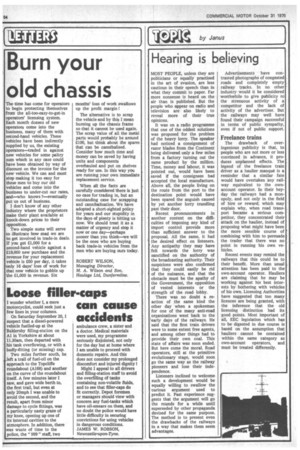Hearing is believing
Page 56

If you've noticed an error in this article please click here to report it so we can fix it.
MOST PEOPLE, unless they are politicians or equally practised in the art of evasion, are less cautious in their speech than in what they commit to paper. Far more nonsense is heard on the air than is published. But the people who appear on radio and television are also likely to reveal more of their true opinions.
It was on a radio programme that one of the oddest solutions was proposed for the problem of the heavy lorry. The speaker had noticed a consignment of razor blades from the Continent being delivered only a few miles from a factory turning out the same product by the million. Time, money and labour, it was pointed out, would have been saved if the consignees had accepted the local manufacture. Above all, the people living on the route from the port to the destination point would have been spared the anguish caused by yet another lorry trundling past their door.
Recent pronouncements in another context on the difficulties of imposing any kind of import control provide more than sufficient answer to the proposal. All the same, it had the desired effect on listeners. Any antipathy they may have felt towards the lorry was sanctified on the authority of the broadcasting authority. Their suspicions were also confirmed that they could easily be rid of the nuisance, and that the obstacle must be the apathy of the Government, the opposition of vested interests or the strength of the road lobby.
There was no doubt a reaction of the same kind the other day when a spokesman for one of the many anti-road organisations went back to the early days of the railways. He said that the first train drivers were to some extent free agents, and among other things had to provide their own coal. This state of affairs was soon ended. But here come the moral. Road operators, still at the primitive evolutionary stage, would soon go the same way as the railway pioneers and lose their independence.
Listeners inclined to welcome such a development would be equally willing to swallow the curious argument used to predict it. Past experience suggests that the argument will go the rounds for a while until superseded by other propaganda devised for the same purpose. The method is to present even the drawbacks of the railways in a way that makes them seem advantages. Advertisements have contrasted photographs of congested roads and completely empty railway tracks. In no other industry would it be considered worthwhile to give publicity to the strenuous activity of a competitor and the lack of activity of the advertiser. But the railways may well have found their campaign successful in terms of public sympathy, even if not of public support.
Freelance trains
The drawback of overingenious publicity is that, to people who are not more or less convinced in advance, it produces unplanned effects. The legend of the freelance train driver as a haulier manqué is a reminder that a similar fate would have overtaken any railway equivalent to the ownaccount operator. In their heyday the railways had a monopoly, and not only in the field of hire or reward; which may explain why, when road transport became a serious competitor, they concentrated their attack on the haulier, instead of proposing what might have been the more sensible course of combining with him to persuade the trader that there was no point in running his own vehicles.
Recent events may remind the railways that this could be to their benefit. More than usual attention has been paid to the own-account operator. Hauliers are claiming that he may be working against his best interests by bothering with vehicles of his own. Licensing Authorities have suggested that too many licences are being granted, with the inference that the old licensing distinction had its good points. Most important of all, EEC legislation which has to be digested in due course is based on the assumption that hauliers cannot be contained within the same category as own-account operators, and must be treated differently.
































































































